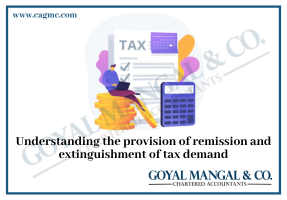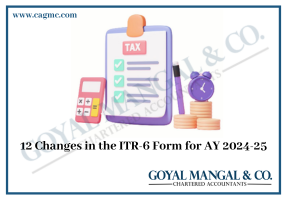
Filing your Income Tax Return (ITR) on time is a legal requirement as well as a critical financial duty. What Happens If You Fail to File ITR On Time, Interest on Outstanding Tax and Loss of Tax Benefits and Ways to Avoid Late Filing. However, life may be hectic, and deadlines might fall through the gaps. In this fast read, we will look at the consequences of failing to file ITR on time, throwing light on the potential financial and legal consequences that people and corporations may face if they miss the deadline. Whether you are a taxpayer who has mistakenly missed the filing date, this article will provide vital insights into what occurs when the tax deadline is missed.
Table of Content
What is ITR?
The income Tax return (ITR) is a form that ought to be submitted to the Income Tax department in India. The Income Tax Return is a every year declaration of a person’s income, deductions, and tax liability for that fiscal year. The Income Tax Act of 1961 requires it to be filed yearly by people and organizations fulfilling detailed earnings criteria. ITR’s important goal is to offer the authorities with a file of a person’s income and tax bills. What Happens If You Fail to File ITR On Time, It aids the government in tax series and acts as evidence of income whilst applying for loans, visas, and different economic services. Penalty for Failure to record ITR if fee isn’t made on time. The Income Tax department has described seven varieties of ITR forms: ITR-1, ITR-2, ITR-3, ITR-4, ITR-5, ITR-6, and ITR-7, with the utility of the form decided with the aid of the character and amount of income, in addition to the form of taxpayer.
Penalties imposed for missing the ITR deadline
Penalties for failing to record an Income Tax Return (ITR) on time may vary depending at the jurisdiction and the particular regulations in impact on the time. However, the subsequent are some typical penalties for late ITR filing:
- Late Filing Fee: If you miss the deadline, several tax authorities charge a ITR late filing fee. This price can be fixed or calculated based on the length of the delay.
- Interest on Outstanding Tax: If you owe taxes and fail to file your ITR on time, you may be charged interest on the outstanding tax amount. The interest rate and calculation method can vary.
- Deductions and benefits may be lost: Some tax deductions and benefits are time-sensitive. If you don’t file ITR on time, you may lose certain deductions, exemptions, or credit which you could otherwise be qualified for.
- Legal Remedies: In rare cases, tax authorities may take legal action against individuals or businesses who fail to file their ITR on time and on a regular basis. Fines, legal notices, and even prosecution are all possibilities.
- Scrutiny: Late filers may face more scrutiny from tax authorities, resulting in a more extensive investigation of their financial records and transactions. This can take time and be stressful.
- Impact on Financial Transactions: As part of their application processes, many financial institutions, such as banks and lenders, may seek verification of ITR filing. Failure to produce ITR on time can make it difficult to receive loans or other financial services.
Interest on Outstanding Tax and Loss of Tax Benefits
If taxes are payable, failure to file the Income Tax Return by way of the due date will result in 1% interest each month till the ITR is filed, interest will be charged at 1% every month until the returns are filed. Aside from the penalty for late ITR filing, interest at 1% per month or part thereof on tax owed will be imposed under Section 234A until taxes are paid.
It is critical to know that you cannot file an ITR unless you have paid your taxes. The interest calculation under this provision shall begin on the day following the due date, i.e. 31 August 2022 for FY 2021-22. As a result, the longer you wait, the more you pay.
Failure to file your Income Tax Return (ITR) on time might result in a number of tax benefits being lost. What Happens If You Fail to File ITR On Time. You may be penalized and charged interest, lose potential refunds, and have difficulty obtaining deductions and credits. Furthermore, noncompliance may result in legal consequences and a harmed financial reputation, impacting your future capacity to obtain loans or government subsidies. To avoid these negative repercussions, you must file your ITR as soon as possible.
Legal Consequences
For salaried individuals: The late fee is Rs.5,000 if an ITR is filed after July 31st of the evaluation year. Furthermore, the maximum penalty is Rs.1,000 for persons with total yearly earnings of less than five lakhs.
For self-employed individuals: The guideline for self-employed people is the same as said above. Within the case of well-known overdue payment, a penalty of 10,000 is paid, and in case you filed your ITR after August 31st, however before December 31st, you have to pay a price of 5000. Similarly, in case your income does no longer exceed five lakhs, you have to pay a rate of one thousand.
For businesses: The rule for late ITR payment applies to both individuals and businesses. The penalty is $10,000, however if your income is less than $5 lakh, you must pay a fee of $1,000.
For Senior citizen: Senior persons will also have to pay a late fine of 10,000 if they fail to file their ITR by the due date, and a fine of 1000 if their income is less than 5 lakhs.
Ways to Avoid Late Filing
Taxpayers can avoid penalties by following these guidelines:
- Keep track of the ITR filing deadline and make sure to file on time.
- Use the ITR form that corresponds to the taxpayer’s income and source of income.
- Include all revenue sources, such as salary, rent, interest, and capital gains.
- Check to ensure that all of the information on the ITR form is correct and complete.
- Pay your taxes on time to avoid paying interest.
Conclusion
To put it simply, What Happens If You Fail to File ITR On Time, it is critical to file your income tax return (ITR) on time to prevent difficulties. If you fail to meet the deadline, you may incur penalties, interest charges, and even legal problems. But it’s not only about avoiding difficulties; filing your ITR on time protects your financial status and maintains your eligibility for tax benefits. So, in order to have a stable financial future and remain on good terms with tax authorities, it is critical to observe tax rules. Remember that there is a penalty for failing to file your ITR by the due date under section 234F of the Income Tax Act.







